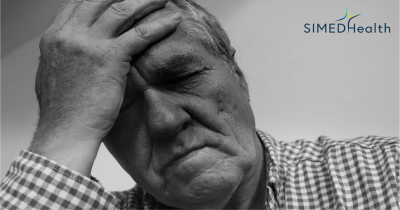
An estimated 2.8 million people suffer from brain injuries annually, and 282,000 of those injuries need hospitalization. March is Brain Injury Awareness Month so we sat down and talked with our newest neurologist, Dr. Justin Yancey about how brain injuries occur, the different types of brain injuries, and what steps are taken to fully recover.
What sort of injuries could be classified as a brain injury?
Dr. Yancey says “Anything that causes injury to healthy brain tissue.” For example, concussions are the most commonly known brain injuries, but lack of oxygen, strokes, and tumors can also be categorized as a brain injury.
What is the difference between a traumatic brain injury and a non-traumatic brain injury?
Non-traumatic brain injuries are not related to a blow to the head but rather an illness or condition within the brain/body. So, while strokes and tumors are brain injuries, they would be non-traumatic. Traumatic brain injuries (TBI) are caused by falls, sports-related hits, gunshot wounds, or explosions as just a couple of examples. TBI’s come from an active hit or injury to the head that is outside of the body.
What is the process you go about to diagnose a brain injury?
To properly diagnose a brain injury there needs to be a medical evaluation by a neurologist. The neurologist will also need to know the patient’s history and will perform a detailed neurological exam. This exam is crucial to determining how big of an effect this brain injury will have on the patient.
After diagnosis, what are treatment plans?
Dr. Yancey says that the treatment plans are dependent on how severe the injury is. If the injury is very severe, it may require surgery if there is brain swelling or blood in the brain and a long term stays in the hospital. If the damage is mild, the patient can just be observed at home. Though patients and their caregivers will be briefed to look for headaches, confusion, vision problems, vomiting, weakness, or an inability to awaken when the patient is taken home.
Also for mild concussions, Dr. Yancey recommends a rest period after, at least 24 hours but possibly longer for some cases. It is important to avoid strenuous mental and physical activity plus the activity that caused the injury as to not make it worse.
Is it possible for someone with a head injury to recover completely?
The good news is Dr. Yancey says it is possible for patients with mild concussions to recover fully, and they typically do. A more severe TBI does, on the other hand, make take longer and be a more complex problem. He also says to try not to get more than head injury because that can cause more permanent effects.
What else do you treat at SIMEDHealth Neurology?
- Seizures
- Memory Loss
- Headaches
- Parkinson’s Disease
- Strokes
- MS
If you have more questions about head injuries, and treatment click here to schedule an appointment with Dr. Yancey today!